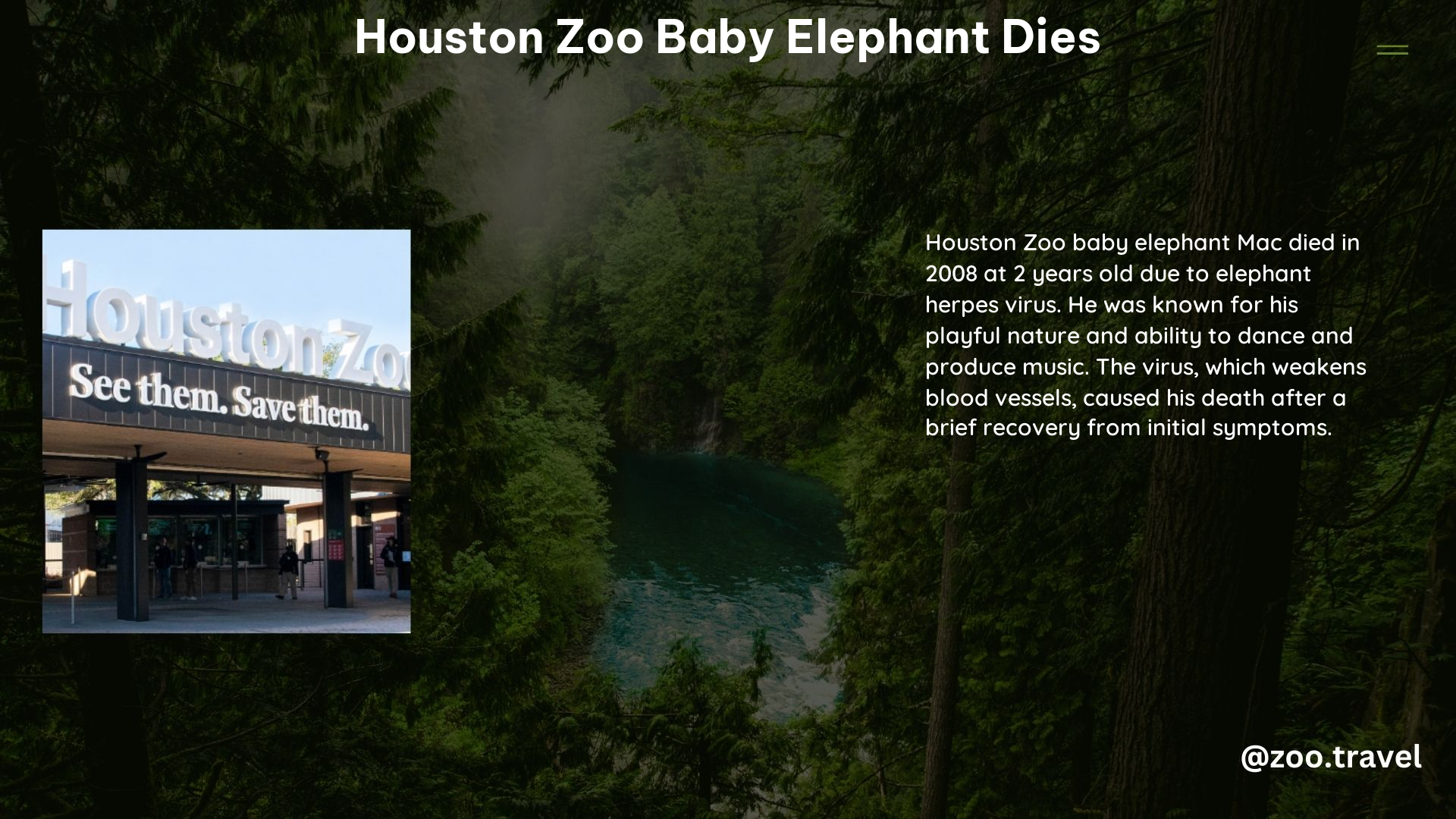The Houston Zoo has faced the heartbreaking loss of several baby elephants over the years, with the elephant herpes virus being a significant contributor to these tragic events. This article delves into the details surrounding these incidents, the challenges faced by the zoo, and the ongoing efforts to understand and combat this elusive virus.
The Tragic Loss of Mac, the 2-Year-Old Asian Elephant
In 2008, the Houston Zoo experienced the sudden and unexpected death of a beloved member of their elephant herd, a 2-year-old Asian elephant named Mac. Mac was known for his playful and intelligent nature, and his passing was a devastating blow to the zoo and its visitors.
The cause of Mac’s death was attributed to a viral illness, specifically the elephant herpes virus. This virus weakens the blood vessels, causing them to leak blood, and the heart pumps faster to compensate, which can sometimes lead to heart failure. The exact cause of the virus remains a mystery, but it is not transmitted sexually. Many elephants carry the virus in a latent form from an early age, and veterinarians are still puzzled as to why it flares up in some animals.
A History of Elephant Deaths at the Houston Zoo

Mac’s death was not an isolated incident. In fact, he was the sixth elephant to die from the elephant herpes virus at the Houston Zoo or at other zoos where Houston Zoo elephants were transferred. Over the last 25 years, none of the 14 calves conceived by the zoo’s elephants have survived.
This tragic history highlights the challenges that zoos face in caring for these majestic creatures. Elephants are highly intelligent and social animals, and their well-being is heavily dependent on the care and attention they receive. The elephant herpes virus has proven to be a formidable foe, and the Houston Zoo has been grappling with its impact for decades.
The Elephant Herpes Virus: A Persistent Threat
The elephant herpes virus is a particularly insidious and elusive pathogen. It weakens the blood vessels, causing them to leak blood, and the heart pumps faster to compensate, which can sometimes lead to heart failure. The exact cause of the virus remains unknown, but it is not transmitted sexually. Many elephants carry the virus in a latent form from an early age, and veterinarians are still puzzled as to why it flares up in some animals.
This virus has been a persistent threat to the Houston Zoo’s elephant population, and the zoo has been working tirelessly to understand and combat it. Researchers have been studying the virus, trying to uncover its origins and develop effective treatments, but the task has proven to be a daunting one.
Recent Developments: A Glimmer of Hope
Despite the tragic history of elephant deaths at the Houston Zoo, there have been some recent developments that offer a glimmer of hope. In 2020, the zoo welcomed a new baby elephant named Nelson, who was born at the facility. Nelson survived a life-threatening condition at birth and is now part of the zoo’s herd of 11 elephants.
This is a significant achievement, as the Houston Zoo has struggled to successfully breed and raise elephant calves in the past. The birth of Nelson is a testament to the dedication and hard work of the zoo’s staff, who have been working tirelessly to provide the best possible care for their elephant herd.
Ongoing Efforts and Challenges
The Houston Zoo’s efforts to understand and combat the elephant herpes virus are ongoing. Veterinarians and researchers continue to study the virus, exploring new treatment options and strategies to prevent its spread. However, the task is not an easy one, and the zoo faces a number of challenges in its efforts to protect its elephant population.
One of the key challenges is the lack of understanding surrounding the virus. Despite years of research, the exact cause of the virus remains a mystery, and veterinarians are still puzzled as to why it flares up in some animals but not others. This makes it difficult to develop effective treatments and preventive measures.
Another challenge is the inherent complexity of caring for elephants in a captive environment. Elephants are highly intelligent and social animals, and their well-being is heavily dependent on the care and attention they receive. Ensuring that the zoo’s elephant herd is healthy and thriving is a constant challenge, and the elephant herpes virus only adds to the complexity of this task.
Conclusion
The Houston Zoo’s struggle with the elephant herpes virus is a tragic and ongoing story. The loss of several baby elephants over the years has been a devastating blow to the zoo and its visitors, and the challenges faced in caring for these majestic creatures are immense.
However, the recent birth of Nelson and the ongoing efforts of the zoo’s staff to understand and combat the virus offer a glimmer of hope. The Houston Zoo’s dedication to the well-being of its elephant herd is commendable, and their continued efforts to protect these animals are a testament to their commitment to conservation and animal welfare.
As we continue to follow the story of the Houston Zoo’s elephant herd, it is important to remember the fragility of these magnificent creatures and the importance of ongoing research and conservation efforts. The elephant herpes virus may be a persistent threat, but with continued dedication and innovation, the Houston Zoo and other zoos around the world can work to protect these animals and ensure their long-term survival.
Reference:
– Elephant Herpes Virus: A Persistent Threat to Captive Elephant Populations
– The Challenges of Caring for Elephants in Captivity
– Houston Zoo Welcomes Baby Elephant After Years of Losses
